North Carolina State University
2012 Incoming Freshmen Survey:
Gender and Racial/Ethnic Comparisons
Preparation for College
This document reports gender and racial/ethnic differences in how well respondents are preparation for college, such as high school preparation, participation in pre-college programs, and current development of various knowledge, skills, and personal development goals. For information about the survey and analysis methods see "2012 Incoming Freshmen Survey: Introduction, Methods, and Student Demographic Profile". Exact question wording is available on the web or by clicking on the "Q" next to the table heading.
High School Preparation | Self Preparation | Participation in Pre-College Programs
Knowledge, Skills, and Personal Development:
Current Development
Importance
Scatterplots: Comparisons of Goal Ratings
| NCSU | Men | Women | Asian Amer |
Black / Afr Amer |
Hispanic |
White |
Other / Unknown |
|
|---|---|---|---|---|---|---|---|---|
| Very well | 52.8% | 55.5% | 50.5% | 56.3% | 42.0% | 47.0% | 54.2% | 52.4% |
| Somewhat well | 39.9% | 37.8% | 41.7% | 37.3% | 48.3% | 47.0% | 39.2% | 35.5% |
| Not very well | 7.3% | 6.7% | 7.7% | 6.3% | 9.7% | 6.1% | 6.7% | 12.0% |
| Total (N) | 2,192 | 1,001 | 1,191 | 126 | 176 | 115 | 1,609 | 166 |
| NCSU | Men | Women | Asian Amer |
Black / Afr Amer |
Hispanic |
White |
Other / Unknown |
|
|---|---|---|---|---|---|---|---|---|
| Very well | 52.7% | 52.7% | 52.8% | 46.0% | 41.5% | 44.3% | 55.5% | 48.5% |
| Somewhat well | 45.3% | 46.0% | 44.8% | 52.4% | 56.3% | 53.0% | 42.7% | 48.5% |
| Not very well | 1.9% | 1.3% | 2.5% | 1.6% | 2.3% | 2.6% | 1.8% | 3.0% |
| Total (N) | 2,177 | 998 | 1,179 | 124 | 176 | 115 | 1,597 | 165 |
| NCSU | Men | Women | Asian Amer |
Black / Afr Amer |
Hispanic |
White |
Other / Unknown |
|
|---|---|---|---|---|---|---|---|---|
| Educational Talent Search | 2.2% | 1.8% | 2.5% | 2.3% | 4.5% | 1.7% | 1.5% | 6.5% |
| Upward Bound | 1.4% | 1.2% | 1.6% | 0.0% | 6.7% | 1.7% | 0.7% | 3.6% |
| GEAR UP | 1.7% | 1.8% | 1.7% | 0.0% | 6.1% | 1.7% | 1.3% | 2.4% |
| Early College | 4.6% | 5.2% | 4.1% | 4.7% | 11.2% | 4.2% | 3.5% | 8.3% |
| Total (N) | 2,239 | 1,028 | 1,211 | 129 | 179 | 118 | 1,644 | 169 |
Back to Top Q Knowledge, Skills, and Personal Development Current Development
| General Education Goals | Mean Rating (4=Excellent, 3=Good, 2=Fair, 1=Poor) |
|||||||
|---|---|---|---|---|---|---|---|---|
| All |
Men |
Women |
Asian Amer |
Black / Afr Amer |
Hispanic |
White |
Other / Unknown |
|
| Development: Listening attentively | 3.28 | 3.24 | 3.32 | 3.20 | 3.24 | 3.34 | 3.31 | 3.08 |
| Development: Ability to plan/carry out projects independently | 3.27 | 3.12 | 3.40 | 3.10 | 3.27 | 3.22 | 3.30 | 3.21 |
| Development: Using technology appropriately | 3.27 | 3.39 | 3.17 | 3.43 | 3.33 | 3.21 | 3.27 | 3.21 |
| Development: Creating and being open to new and worthwhile ideas and perspectives | 3.27 | 3.24 | 3.30 | 3.26 | 3.43 | 3.26 | 3.25 | 3.31 |
| Development: Using mathematical skills | 3.17 | 3.37 | 2.99 | 3.30 | 3.05 | 3.06 | 3.19 | 3.06 |
| Development: Finding information using technology and evaluating it | 3.15 | 3.22 | 3.08 | 3.17 | 3.25 | 3.14 | 3.14 | 3.06 |
| Development: Comprehending written and oral information | 3.15 | 3.14 | 3.16 | 3.06 | 3.13 | 3.13 | 3.17 | 3.03 |
| Development: Effectively analyzing/evaluating evidence, arguments, claims, and beliefs | 3.02 | 3.10 | 2.95 | 2.91 | 3.01 | 3.07 | 3.03 | 2.94 |
| Development: Identifying a problem/concept and articulating its components | 3.01 | 3.07 | 2.97 | 2.93 | 2.93 | 2.98 | 3.03 | 2.99 |
| Development: Solving real world problems in ways that demonstrate imagination/creativity | 2.94 | 2.99 | 2.90 | 2.81 | 2.91 | 2.84 | 2.96 | 2.91 |
| Development: Creating/distributing information using multiple communication forms | 2.88 | 2.88 | 2.88 | 3.08 | 2.98 | 2.83 | 2.86 | 2.84 |
| Development: Applying scientific methods of inquiry | 2.85 | 3.00 | 2.72 | 2.80 | 2.61 | 2.81 | 2.88 | 2.83 |
| Development: Capacity to engage with/respond to creative works and evaluate significance | 2.85 | 2.70 | 2.98 | 3.09 | 3.05 | 2.91 | 2.80 | 2.91 |
| Development: Writing effectively | 2.84 | 2.78 | 2.89 | 2.69 | 2.89 | 2.76 | 2.86 | 2.76 |
| Development: Speaking effectively | 2.69 | 2.74 | 2.65 | 2.50 | 2.74 | 2.63 | 2.71 | 2.62 |
Back to Top
| Personal Development Goals | Mean Rating (4=Excellent, 3=Good, 2=Fair, 1=Poor) |
|||||||
|---|---|---|---|---|---|---|---|---|
| All |
Men |
Women |
Asian Amer |
Black / Afr Amer |
Hispanic |
White |
Other / Unknown |
|
| Development: Potential for success | 3.54 | 3.55 | 3.54 | 3.38 | 3.63 | 3.57 | 3.56 | 3.39 |
| Development: Taking responsibility for my own behavior | 3.52 | 3.51 | 3.52 | 3.39 | 3.71 | 3.55 | 3.51 | 3.43 |
| Development: Working effectively as part of a team | 3.37 | 3.36 | 3.37 | 3.36 | 3.42 | 3.26 | 3.39 | 3.19 |
| Development: Recognizing and acting on ethical principles | 3.33 | 3.28 | 3.37 | 3.43 | 3.46 | 3.37 | 3.32 | 3.20 |
| Development: Experiencing personal growth | 3.31 | 3.30 | 3.32 | 3.30 | 3.35 | 3.27 | 3.31 | 3.30 |
| Development: Developing leadership skills | 3.07 | 3.05 | 3.09 | 2.77 | 3.07 | 3.07 | 3.10 | 3.01 |
| Development: Developing and sustaining active and healthy lifestyle | 3.06 | 3.13 | 3.01 | 2.80 | 2.81 | 2.94 | 3.13 | 2.96 |
| Development: Ability to reflect, review, self-regulate, and self-examine | 3.03 | 3.03 | 3.03 | 2.89 | 3.13 | 2.95 | 3.05 | 2.91 |
| Development: Viewing failure as an opportunity to learn | 2.94 | 3.03 | 2.87 | 2.97 | 3.11 | 2.82 | 2.93 | 2.90 |
| Development: Being involved in public and community affairs | 2.86 | 2.71 | 2.99 | 2.79 | 2.93 | 2.87 | 2.86 | 2.79 |
| Development: Ability to handle stress | 2.81 | 3.04 | 2.61 | 2.75 | 2.76 | 2.77 | 2.83 | 2.72 |
| Development: Time management | 2.69 | 2.60 | 2.76 | 2.42 | 2.45 | 2.58 | 2.75 | 2.57 |
Back to Top
| World View Goals | Mean Rating (4=Excellent, 3=Good, 2=Fair, 1=Poor) |
|||||||
|---|---|---|---|---|---|---|---|---|
| All |
Men |
Women |
Asian Amer |
Black / Afr Amer |
Hispanic |
White |
Other / Unknown |
|
| Development: Ability to work with people from diverse backgrounds | 3.46 | 3.42 | 3.49 | 3.60 | 3.69 | 3.60 | 3.41 | 3.45 |
| Development: Sensitivity to issues associated with racial equity | 3.34 | 3.28 | 3.39 | 3.50 | 3.57 | 3.45 | 3.29 | 3.41 |
| Development: Sensitivity to issues associated with gender equity | 3.27 | 3.19 | 3.34 | 3.39 | 3.44 | 3.29 | 3.24 | 3.30 |
| Development: Understanding/respecting diverse cultures, values, and perspectives | 3.25 | 3.19 | 3.31 | 3.54 | 3.59 | 3.42 | 3.18 | 3.33 |
| Development: Appreciating differences in sexual orientation | 3.17 | 3.03 | 3.28 | 3.41 | 3.37 | 3.31 | 3.11 | 3.24 |
| Development: Understanding the commonality of human problems globally | 2.96 | 3.02 | 2.92 | 3.15 | 3.02 | 3.01 | 2.94 | 2.97 |
| Development: Understanding the present as it relates to historical events | 2.95 | 3.08 | 2.85 | 2.85 | 3.03 | 2.89 | 2.96 | 2.92 |
| Development: Understanding issues and problems facing the world | 2.86 | 2.96 | 2.78 | 2.85 | 2.95 | 2.89 | 2.86 | 2.80 |
Back to Top Importance
| General Education Goals | Mean Rating (4=Very important, 3=Somewhat important, 2=Not very important, 1=Not at all important) |
|||||||
|---|---|---|---|---|---|---|---|---|
| All |
Men |
Women |
Asian Amer |
Black / Afr Amer |
Hispanic |
White |
Other / Unknown |
|
| Importance: Listening attentively | 3.75 | 3.70 | 3.79 | 3.72 | 3.85 | 3.80 | 3.73 | 3.78 |
| Importance: Comprehending written and oral information | 3.74 | 3.67 | 3.79 | 3.78 | 3.80 | 3.76 | 3.73 | 3.74 |
| Importance: Ability to plan/carry out projects independently | 3.71 | 3.65 | 3.76 | 3.66 | 3.82 | 3.69 | 3.70 | 3.71 |
| Importance: Using mathematical skills | 3.63 | 3.72 | 3.55 | 3.63 | 3.63 | 3.65 | 3.62 | 3.64 |
| Importance: Using technology appropriately | 3.62 | 3.65 | 3.60 | 3.69 | 3.69 | 3.68 | 3.62 | 3.52 |
| Importance: Creating and being open to new and worthwhile ideas and perspectives | 3.61 | 3.54 | 3.67 | 3.72 | 3.69 | 3.64 | 3.59 | 3.64 |
| Importance: Solving real world problems in ways that demonstrate imagination/creativity | 3.60 | 3.57 | 3.63 | 3.64 | 3.65 | 3.57 | 3.60 | 3.64 |
| Importance: Speaking effectively | 3.60 | 3.52 | 3.67 | 3.66 | 3.75 | 3.63 | 3.57 | 3.68 |
| Importance: Finding information using technology and evaluating it | 3.56 | 3.56 | 3.56 | 3.65 | 3.68 | 3.63 | 3.54 | 3.53 |
| Importance: Identifying a problem/concept and articulating its components | 3.55 | 3.54 | 3.55 | 3.55 | 3.65 | 3.59 | 3.53 | 3.58 |
| Importance: Effectively analyzing/evaluating evidence, arguments, claims, and beliefs | 3.46 | 3.43 | 3.50 | 3.47 | 3.51 | 3.54 | 3.45 | 3.52 |
| Importance: Writing effectively | 3.38 | 3.22 | 3.51 | 3.37 | 3.64 | 3.45 | 3.32 | 3.55 |
| Importance: Applying scientific methods of inquiry | 3.37 | 3.41 | 3.32 | 3.43 | 3.29 | 3.45 | 3.36 | 3.38 |
| Importance: Creating/distributing information using multiple communication forms | 3.19 | 3.15 | 3.22 | 3.22 | 3.37 | 3.28 | 3.15 | 3.23 |
| Importance: Capacity to engage with/respond to creative works and evaluate significance | 2.98 | 2.83 | 3.11 | 3.33 | 3.17 | 3.10 | 2.91 | 3.16 |
Back to Top
| Personal Development Goals | Mean Rating (4=Very important, 3=Somewhat important, 2=Not very important, 1=Not at all important) |
|||||||
|---|---|---|---|---|---|---|---|---|
| All |
Men |
Women |
Asian Amer |
Black / Afr Amer |
Hispanic |
White |
Other / Unknown |
|
| Importance: Time management | 3.87 | 3.84 | 3.90 | 3.88 | 3.94 | 3.88 | 3.86 | 3.88 |
| Importance: Potential for success | 3.87 | 3.86 | 3.89 | 3.78 | 3.96 | 3.90 | 3.88 | 3.84 |
| Importance: Taking responsibility for my own behavior | 3.81 | 3.77 | 3.84 | 3.76 | 3.88 | 3.87 | 3.80 | 3.83 |
| Importance: Ability to handle stress | 3.80 | 3.73 | 3.85 | 3.76 | 3.86 | 3.79 | 3.79 | 3.80 |
| Importance: Experiencing personal growth | 3.79 | 3.76 | 3.83 | 3.82 | 3.89 | 3.90 | 3.78 | 3.79 |
| Importance: Working effectively as part of a team | 3.77 | 3.74 | 3.79 | 3.71 | 3.81 | 3.74 | 3.77 | 3.77 |
| Importance: Developing and sustaining active and healthy lifestyle | 3.77 | 3.73 | 3.80 | 3.78 | 3.84 | 3.75 | 3.77 | 3.71 |
| Importance: Developing leadership skills | 3.72 | 3.68 | 3.76 | 3.66 | 3.83 | 3.73 | 3.71 | 3.71 |
| Importance: Recognizing and acting on ethical principles | 3.67 | 3.60 | 3.73 | 3.68 | 3.78 | 3.79 | 3.64 | 3.67 |
| Importance: Viewing failure as an opportunity to learn | 3.67 | 3.64 | 3.70 | 3.66 | 3.79 | 3.66 | 3.66 | 3.66 |
| Importance: Ability to reflect, review, self-regulate, and self-examine | 3.57 | 3.53 | 3.61 | 3.65 | 3.76 | 3.62 | 3.53 | 3.66 |
| Importance: Being involved in public and community affairs | 3.44 | 3.31 | 3.56 | 3.54 | 3.54 | 3.48 | 3.41 | 3.53 |
Back to Top
| World View Goals | Mean Rating (4=Very important, 3=Somewhat important, 2=Not very important, 1=Not at all important) |
|||||||
|---|---|---|---|---|---|---|---|---|
| All |
Men |
Women |
Asian Amer |
Black / Afr Amer |
Hispanic |
White |
Other / Unknown |
|
| Importance: Ability to work with people from diverse backgrounds | 3.71 | 3.62 | 3.78 | 3.77 | 3.88 | 3.77 | 3.68 | 3.74 |
| Importance: Understanding/respecting diverse cultures, values, and perspectives | 3.61 | 3.51 | 3.71 | 3.69 | 3.84 | 3.73 | 3.57 | 3.66 | Importance: Understanding issues and problems facing the world | 3.60 | 3.55 | 3.65 | 3.66 | 3.70 | 3.61 | 3.58 | 3.64 |
| Importance: Sensitivity to issues associated with racial equity | 3.53 | 3.41 | 3.62 | 3.63 | 3.77 | 3.66 | 3.47 | 3.60 |
| Importance: Understanding the commonality of human problems globally | 3.48 | 3.43 | 3.51 | 3.60 | 3.60 | 3.48 | 3.45 | 3.52 |
| Importance: Sensitivity to issues associated with gender equity | 3.44 | 3.33 | 3.54 | 3.54 | 3.61 | 3.56 | 3.40 | 3.47 |
| Importance: Understanding the present as it relates to historical events | 3.38 | 3.38 | 3.37 | 3.30 | 3.51 | 3.28 | 3.37 | 3.46 |
| Importance: Appreciating differences in sexual orientation | 3.30 | 3.15 | 3.43 | 3.43 | 3.52 | 3.44 | 3.25 | 3.45 |
Back to Top
Scatterplots: Comparisons of Goal Ratings
(a graphical representation of the relationship between current development and importance ratings of general education, personal development, and world view goals)
Scatterplot Comparing Goal Development and Goal Importance Ratings (All Respondents)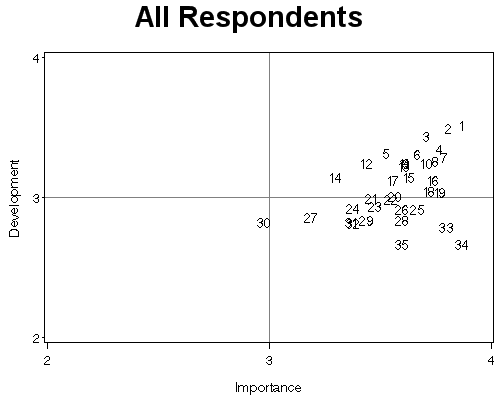
| 1 Potential for success | 19 Developing/sustaining an active and healthy lifestyle |
|---|---|
| 2 Taking responsibility for own behavior | 20 Ability to reflect, review, self-regulate, and self-examine |
| 3 Ability to work with people from diverse backgrounds | 21 Analyzing/evaluating evidence, arguments, claims, and beliefs |
| 4 Working effectively as part of a team | 22 Identifying a problem/concept and articulating its components |
| 5 Appreciating racial equity | 23 Understanding the commonality of human problems globally |
| 6 Acting on ethical principles | 24 Understanding present as it relates to historical events |
| 7 Experiencing personal growth | 25 Viewing failure as an opportunity to learn |
| 8 Listening attentively | 26 Solving real world problems imaginatively and creatively |
| 9 Using technology appropriately | 27 Creating/distributing information using multiple communication forms |
| 10 Ability to plan/carry out projects independently | 28 Understanding issues/problems facing the world |
| 11 Being open to new ideas and perspectives | 29 Being involved in public and community affairs |
| 12 Appreciating gender equity | 30 Capacity to engage and respond to creative works and evaluate significance |
| 13 Respecting diverse cultures, values and perspectives | 31 Applying scientific methods of inquiry |
| 14 Appreciating differences in sexual orientation | 32 Writing effectively |
| 15 Using mathematical skills | 33 Ability to handle stress |
| 16 Comprehending written and oral information | 34 Time management |
| 17 Finding and evaluating information using technology | 35 Speaking effectively |
| 18 Developing leadership skills |
Back to Top
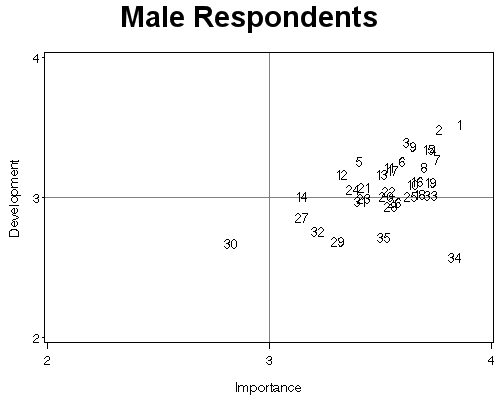
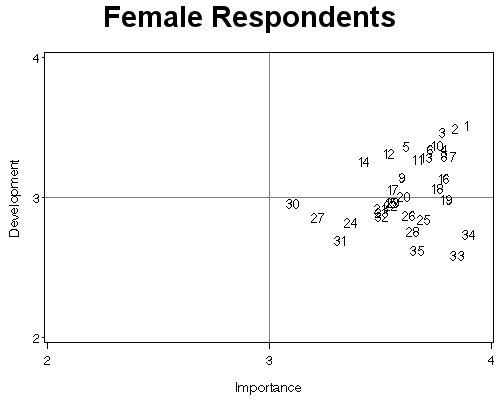
| 1 Potential for success | 19 Developing/sustaining an active and healthy lifestyle |
|---|---|
| 2 Taking responsibility for own behavior | 20 Ability to reflect, review, self-regulate, and self-examine |
| 3 Ability to work with people from diverse backgrounds | 21 Analyzing/evaluating evidence, arguments, claims, and beliefs |
| 4 Working effectively as part of a team | 22 Identifying a problem/concept and articulating its components |
| 5 Appreciating racial equity | 23 Understanding the commonality of human problems globally |
| 6 Acting on ethical principles | 24 Understanding present as it relates to historical events |
| 7 Experiencing personal growth | 25 Viewing failure as an opportunity to learn |
| 8 Listening attentively | 26 Solving real world problems imaginatively and creatively |
| 9 Using technology appropriately | 27 Creating/distributing information using multiple communication forms |
| 10 Ability to plan/carry out projects independently | 28 Understanding issues/problems facing the world |
| 11 Being open to new ideas and perspectives | 29 Being involved in public and community affairs |
| 12 Appreciating gender equity | 30 Capacity to engage and respond to creative works and evaluate significance |
| 13 Respecting diverse cultures, values and perspectives | 31 Applying scientific methods of inquiry |
| 14 Appreciating differences in sexual orientation | 32 Writing effectively |
| 15 Using mathematical skills | 33 Ability to handle stress |
| 16 Comprehending written and oral information | 34 Time management |
| 17 Finding and evaluating information using technology | 35 Speaking effectively |
| 18 Developing leadership skills |
Back to Top
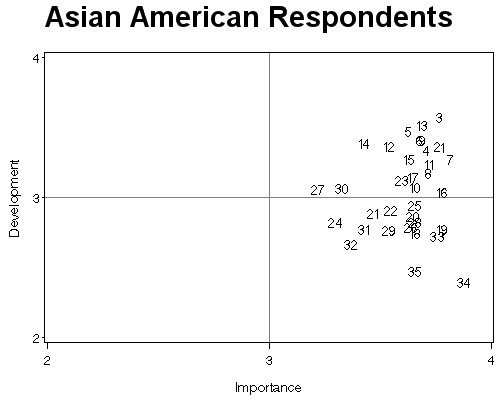
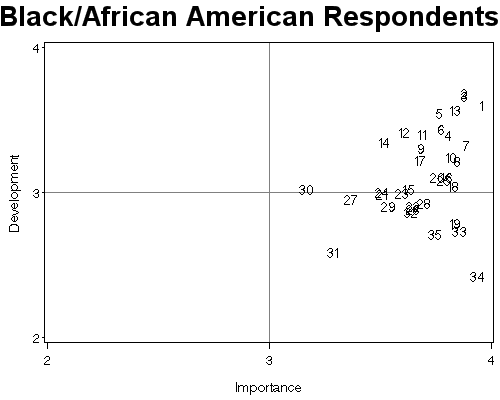
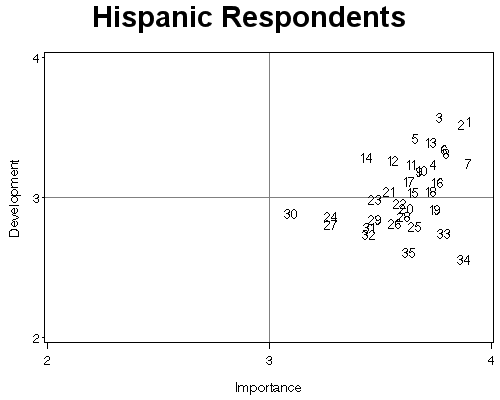
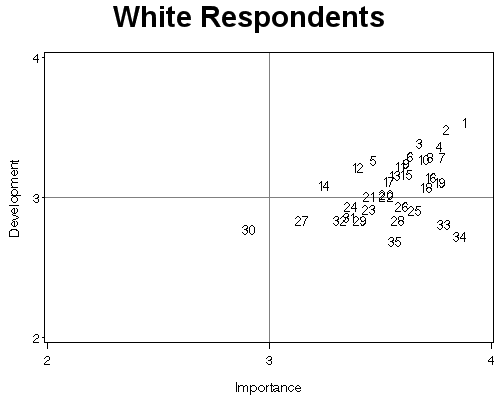
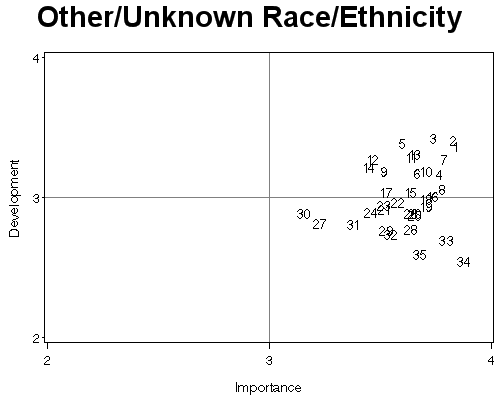
| 1 Potential for success | 19 Developing/sustaining an active and healthy lifestyle |
|---|---|
| 2 Taking responsibility for own behavior | 20 Ability to reflect, review, self-regulate, and self-examine |
| 3 Ability to work with people from diverse backgrounds | 21 Analyzing/evaluating evidence, arguments, claims, and beliefs |
| 4 Working effectively as part of a team | 22 Identifying a problem/concept and articulating its components |
| 5 Appreciating racial equity | 23 Understanding the commonality of human problems globally |
| 6 Acting on ethical principles | 24 Understanding present as it relates to historical events |
| 7 Experiencing personal growth | 25 Viewing failure as an opportunity to learn |
| 8 Listening attentively | 26 Solving real world problems imaginatively and creatively |
| 9 Using technology appropriately | 27 Creating/distributing information using multiple communication forms |
| 10 Ability to plan/carry out projects independently | 28 Understanding issues/problems facing the world |
| 11 Being open to new ideas and perspectives | 29 Being involved in public and community affairs |
| 12 Appreciating gender equity | 30 Capacity to engage and respond to creative works and evaluate significance |
| 13 Respecting diverse cultures, values and perspectives | 31 Applying scientific methods of inquiry |
| 14 Appreciating differences in sexual orientation | 32 Writing effectively |
| 15 Using mathematical skills | 33 Ability to handle stress |
| 16 Comprehending written and oral information | 34 Time management |
| 17 Finding and evaluating information using technology | 35 Speaking effectively |
| 18 Developing leadership skills |
Back to Top
Dr. Nancy Whelchel, Associate Director for Survey Research
Office of Institutional Planning and Research
Box 7002
NCSU
Phone: (919) 515-4184
Email: Nancy_Whelchel@ncsu.edu
Posted: April 2012
Return to 2012 Incoming Freshmen Survey Table of Contents Page
